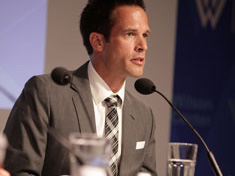-
Complicated Causality: Edward Carr on Food Security and Conflict
September 20, 2013 By Jacob Glass
“It seems to me the food security linkage suffers from the same problem that an awful lot of the environment and conflict literature suffers from: There are more negative cases than positive cases,” says Edward Carr in this week’s podcast. “In other words, you have a lot of cases where there is a [food] price spike and no violence or no conflict.”
“It seems to me the food security linkage suffers from the same problem that an awful lot of the environment and conflict literature suffers from: There are more negative cases than positive cases,” says Edward Carr in this week’s podcast. “In other words, you have a lot of cases where there is a [food] price spike and no violence or no conflict.”
Carr, professor of geography at the University of South Carolina and a former AAAS Fellow at USAID, spoke at the Wilson Center on September 12 during the launch of Harvesting Peace: Food Security, Conflict, and Cooperation. Authored by Emmy Simmons, the latest edition of ECSP Report probes the relationship between food security and conflict, an issue that rose to prominence following the 2008 global food price spike that touched off violent riots around the world.
Although there is a robust body of research supporting the idea that conflict leads to food insecurity, the extent to which food insecurity causes conflict is less understood. According to Carr, the difficulty of making that link arises in part from the wide array of factors that precipitate the emergence of political instability or conflict.
“What if [food security] is the seventh, eighth, or tenth most important thing going on in a particular conflict situation?” he asks. “If it’s that far down the line, is this something that USAID or any other donor organization should be looking at, or should they be dealing with the first six problems?”
At a time of shrinking budgets and fiscal sequestration, the development community must carefully focus its limited resources, says Carr. “While root causes aren’t always addressable…we need to understand what we’re trying to address when we are designing and implementing development programs.”
Carr describes a hypothetical scenario in which an unusually heavy rain, followed by drought, leaves farmers in a sub-Saharan African village without crops or income, and therefore unable to meet their food needs. To demand assistance from their government, the community marches on a local government office. When the government is unresponsive, the march turns into a violent riot.
“In this scenario, do we want to say that food security was the cause of the riot?” asks Carr. “Or was it a state that lacked the capacity to maintain its infrastructure in the face of climate variability or meet the emergency needs of its people?”
Friday podcasts are also available for download from iTunes.
 A Publication of the Stimson Center.
A Publication of the Stimson Center.




